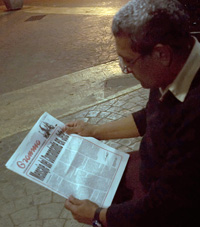 Don’t expect much to change between the U.S. and Cuba once Fidel Castro is no longer the president of the country. Gary Prevost doesn’t and he should know. Prevost, a political science professor at College of St. Benedict – St. John’s University in Collegeville, is a member of the Minnesota Cuba Committee, which supports normalization of relations with the country. He was last in Cuba in November 2006, a few months after Castro fell ill.
Don’t expect much to change between the U.S. and Cuba once Fidel Castro is no longer the president of the country. Gary Prevost doesn’t and he should know. Prevost, a political science professor at College of St. Benedict – St. John’s University in Collegeville, is a member of the Minnesota Cuba Committee, which supports normalization of relations with the country. He was last in Cuba in November 2006, a few months after Castro fell ill.
“As long as the Cuban Communist system remains in place — and there’s no reason to believe that it will at any time in the immediate future change — it’s not likely that there will be fundamental change in U.S. policy toward Cuba,” according to Prevost. “Part of that is because more and more, Cuba has not needed the United States. Its very close relations with Venezuela, increasing ties with China, have made the United States less important to Cuba, meaning the likelihood that they would make dramatic concessions to the U.S. to gain better relations are not likely.”
That’s not to say there hasn’t been somechange, however. Minnesota companies, and small farmers, have benefited from a warming in some trade. The country, according to Prevost, ranks 25th in agricultural imports from the U.S. But there is no reciprocation; Cuban products are not available to U.S. consumers.
Prevost, who has written a couple of books on the subject, dismisses the importance of Florida as a political prize as a factor in Cuba-U.S. relations. “Basically, the continued hostility toward Cuba has to be seen in the whole history of Cuban-U.S. relations, going back to the 19th century when the U.S. saw Cuba as an island to be annexed… It’s that the Cubans have continued to insist that they are not going to re-enter the United States’ sphere of influence, to be directly under the control of Washington, from their perspective to surrender their sovereignty.”
Listen to excerpts of my interview with Prevost (All in MP3 format):
* On Castro’s decision not to stand for election as president. (Listen)
* Eighteen months of Raul Castro’s leadership has given us a glimpse of the future. (Listen)
* Political importance of Florida is not the biggest barrier to normalized relations. (Listen)
* The chance of change. (Listen)
* About the Minnesota Cuba Committee (Listen)
Photo: A Cuban citizen reads the front page of Granma, the official organ of the Communist Party with a statement of Fidel Castro in Havana, on Tuesday (Adalberto Roque/AFP/Getty Images)
